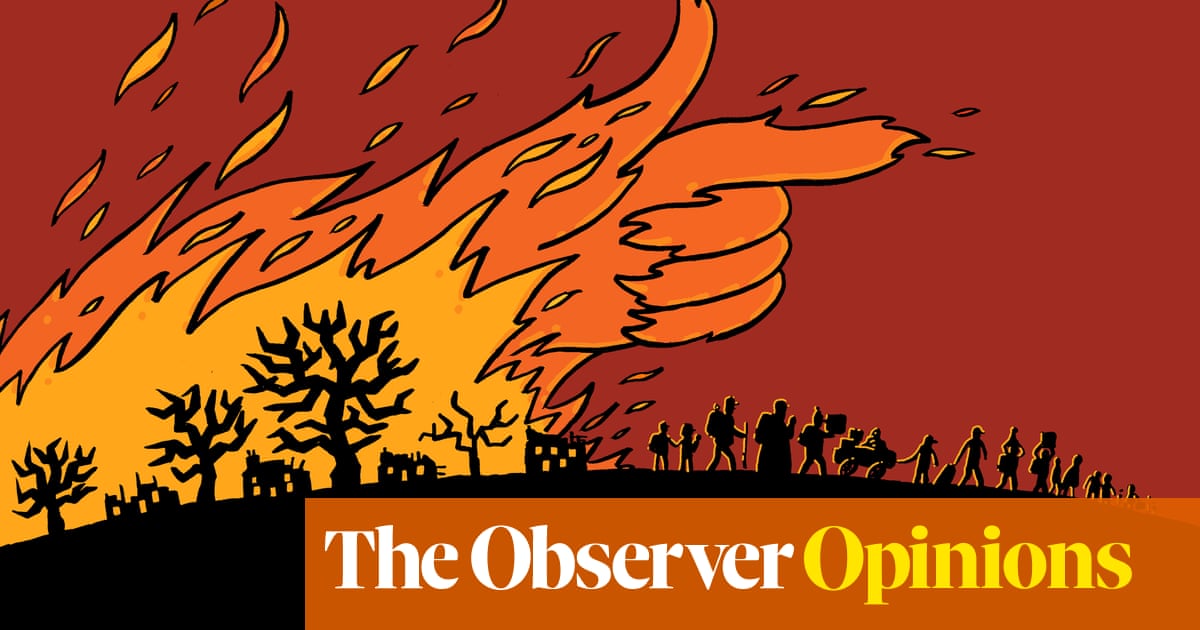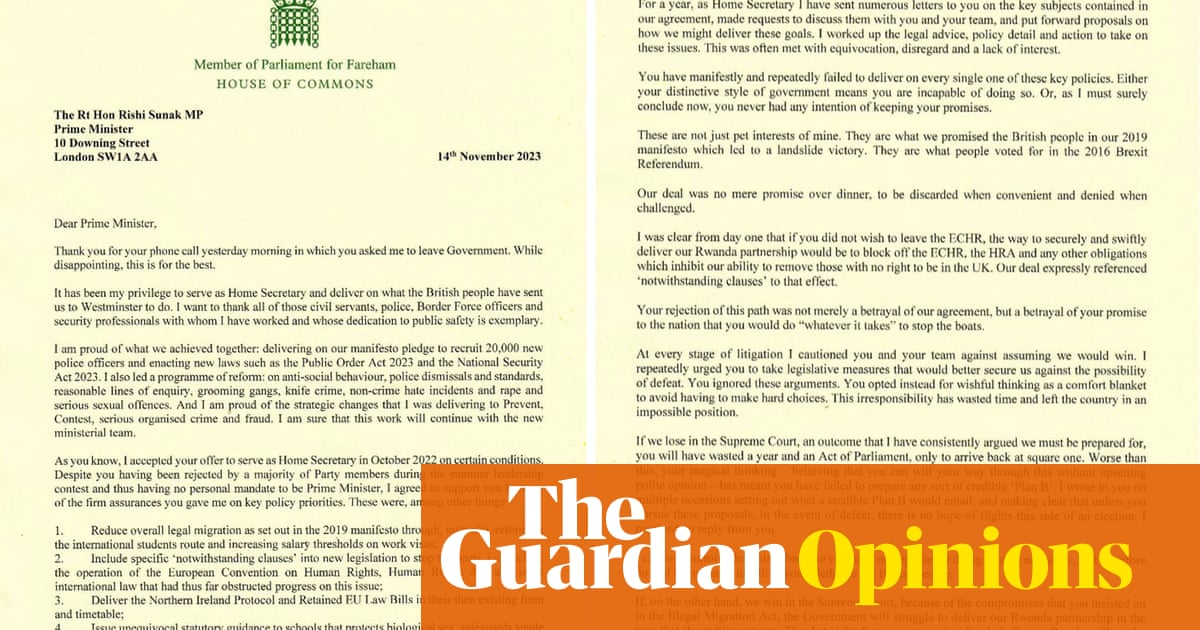
Suella Braverman is right when she says there is a “hurricane” of migration coming, but the UK home secretary has no plan to weather the storm and her actions leave us all exposed.
Braverman’s populist speech, a thinly disguised leadership campaign, at the Tory party conference last week, contained all the predictable tropes and dog whistles aimed at bolstering nationalism: the trumped-up threat of outsiders; the mysterious and ubiquitous “woke” menace; and the liberal elites with their “luxury beliefs”.
To be clear, in this last she was not talking about the multimillionaires in her party’s leadership, but rather the millions of ordinary people such as nurses, teachers and care workers, whose luxury beliefs include compassion towards migrants, including their overstretched colleagues.
Surveys consistently show that despite the best efforts of Braverman, her predecessor and our histrionic tabloids to divide society, xenophobia is actually falling in Britain, with attitudes to migrants becoming increasingly positive.
Britons also have among the most positive attitudes towards refugees in the world; two-thirds of us believe asylum seekers should be allowed to work while waiting for a decision, for instance. Dissatisfaction with the government’s handling of immigration, however, is at its highest level in almost a decade.
Increasingly bizarre and stringent immigration policies have hit pretty much every sector, from small businesses to big industry to universities to the NHS. The mismanagement of asylum cases swings between farcical and tragic, and cost the taxpayer £4bn over the past year, compared with just £500m a decade ago.
Last month it was revealed that the UK spends 40% a person more than any other European country on housing asylum seekers. This now comes out of the official aid budget, cutting by 16.4% the amount of aid spent overseas last year.
Migrant labour has always been key to modern productive economies, whether from rural to urban or from overseas, but as nations wake up to the impending demographic crisis, the need has never been greater. Like most industrialised nations, we are not having enough babies to support our ageing population. This risks upending the social contract whereby the young workforce pays for the care of the retired and incapacitated population, while also growing the economy to improve everyone’s living standards.
To maintain a stable population, on average women need to have 2.1 babies in their lifetime. In the UK, as in many other countries, we are far below this. In South Korea, it’s 0.78 and to date, no countries have reversed this trend, despite their best pro-baby-generation policies. Except through immigration.
Populist leaders have controlled the narrative on immigration for too long — and, more worryingly, moderate and leftwing parties have let them define it. There has been a timidity by liberal parties to challenge toxic rhetoric with evidence-based facts, and to generate a new, inclusive, and pragmatic, narrative around immigration.
This must change, because a hurricane is coming. We face a century of upheaval. As the planet continues to heat in the coming decades, extreme events will become more frequent and severe, particularly across the tropics, where people’s homes, agriculture and infrastructure are threatened.
Models show the expansion of deserts across farmland, increasing vulnerability of coastal areas and deltas (the location of many of the world’s biggest cities) and deadly heat making life unbearable, unsafe and pushing food prices beyond affordability.
Large parts of the world, home to big populations, are becoming increasingly unliveable – by 2070, between 3 billion and 6 billion people (up to half of the world’s population) could be living outside of humanity’s “climate niche”. This year has given us a taste of what’s to come: record-breaking heatwaves with temperatures exceeding 50C (122F) in multiple continents, wildfires causing mass evacuations, from Canada to Greece, floods displacing thousands and destroying vast breadbaskets, and drought that shuts down hydropower and devastates harvests.
As places become unliveable, people will move to safer areas, initially within their own countries, but as countries and entire regions are hit with multiple and cascading events, from chronic drought to flash floods, people will shift across continents. Nowhere will escape the negative impacts of this hotter world, but the far north will generally be safer.
This century will see a massive redistribution not just of people but also capital, resources, industry, food and other production. Climate migration is already under way and is now inevitable, although the scale depends on our response. If we want fewer people to have to move, we must reduce the climate effects pushing them through rapid decarbonisation and we can help them stay by financing adaptation in the most vulnerable areas.
Given that people will be moving in their hundreds of millions or billions over the coming decades, we must prepare. Engineers design hurricane-resistance not by building enormous immovable walls, but by incorporating dynamic capabilities through flexible design. We will not be able to prevent people moving with hateful statements, by building walls or turning back boats. We need flexible progressive policy design that recognises the new world we are entering.
Human mobility this century is a planetary issue that will affect every country and needs a pragmatic, coordinated approach from cities, states, regions and global bodies. It calls for visionary leadership to build agreements, create a safe, conflict-free transition and an inspiring new narrative around sustainable, flourishing cities of opportunity, diversity and innovation.
Braverman is clearly not this visionary leader. But neither is this a job for a home secretary – migration is not a security issue; it is primarily a labour issue (and a humanitarian issue) and should be managed as such.
Well-managed migration requires initial investment (which will be more than repaid) – both, financial investment in sufficient housing, access to healthcare, education and infrastructure; and also social investment in the kind of inclusive society that helps new and existing citizens thrive. This government has failed to provide these basics to its current population, let alone migrants, and all too predictably resorts to desperate populism. We deserve leadership commensurate with the scale of the challenge.
Gaia Vince is an author, journalist and broadcaster. Her latest book is Nomad Century












